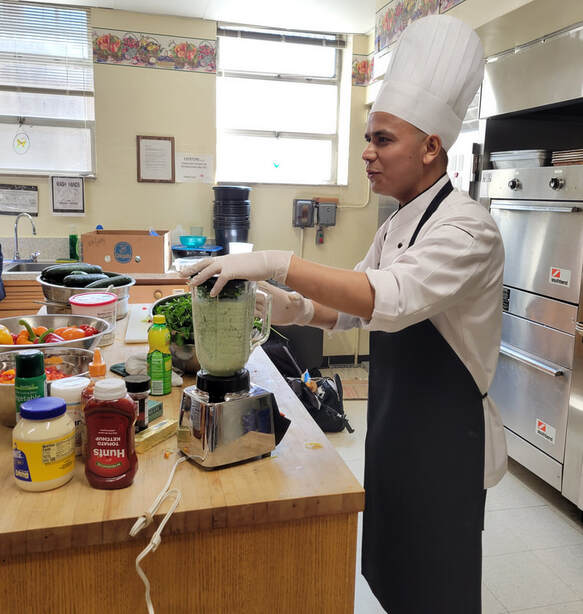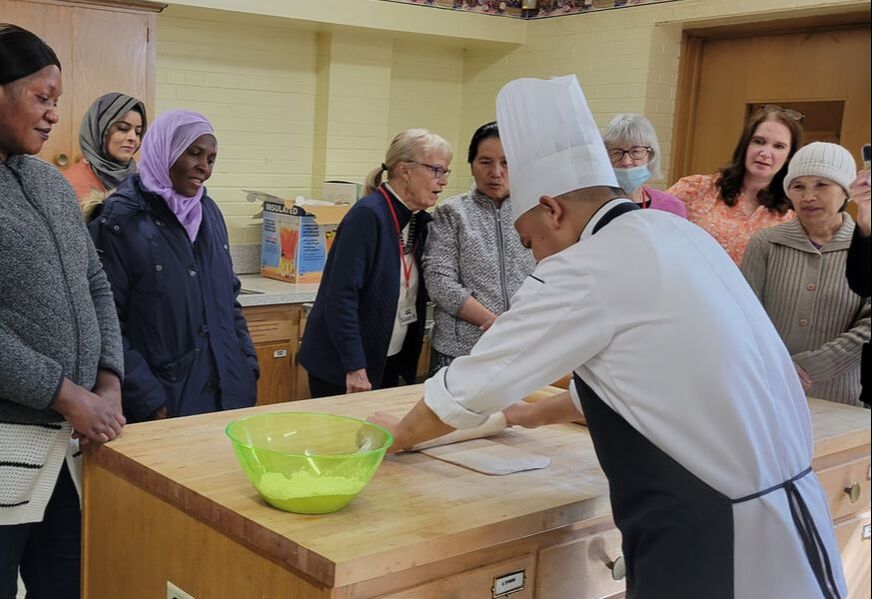ESL Hosts Cooking Class
ESL Cooking Class, led by Surrendra Rawat of India Palace restaurant.

Literacy’s two ends
When you think about literacy, what comes to mind? One good way to think about these valuable skills is that literacy has two ends. This story—featuring one of our ESL students who’s also a chef, some photos of a unique, recent event and a summary of what this sturdy, shared ministry accomplishes--illustrates how Faith’s ESL program benefits participants at each end.
In partnership with People’s Resource Center, Faith continues its seventeen-year history of assisting students increase their English communication skills. Led by a trio of leaders from Faith—Debbie Fulks, Sylvia Wulffen and Kathy Holz—the main group of students and tutors meets each Tuesday morning during the school year. (Other tutor/student pairings learn offsite or virtually.) Students work diligently at the difficult task of learning our complex language.
At one end of the literacy continuum, English proficiency brings a practical benefit: Participating in the life of this country as fully as possible. Markers of success along the way include obtaining driver’s licenses, citizenship and employment. Insights accumulate, friendships are formed and self-confidence blossoms. Many students count ESL as a key element in their assimilation into the United States.
The other end of literacy skill-development might seem intangible, but it’s equally important: Developing leadership and strengthening connections with the wider community. Surendra Rawat, Executive Chef at India Palace Restaurant in Wheaton, is an example. Chef Rawat has been an ESL student at Faith for several years, working towards improving his writing and presentation skills. During those years, he has completed a high-level writing class at COD, and published online the findings of his research paper—regarding the use of social media in the restaurant industry. He is currently composing poems, which require a finely honed and detail-oriented approach to every single word and every punctuation mark a writer might choose.
A few weeks ago during an ESL session, Chef Rawat conducted a demonstration class in Indian cooking, inviting students and tutors—and guests from the staff of People’s Resource Center—to see the broader usefulness of English proficiency. His motivation was simple: “PRC and Faith have given me so much; I want to thank you all—to pay you back for your generosity.” And so he did. (See the accompanying photos.)
During the hands-on demonstration—Surendra’s first-ever—tutors and students noted the composition of recipes, the writing of directions and the vocabulary of food preparation. PRC staff saw firsthand another value of literacy instruction: Proficiency that creates generosity and benefits others—in a word, leadership. And of course, all participants enjoyed the end results of their shared efforts: Delicious Indian roti rolls!
Thanks to the scores of Faith members who have been part of this shared ministry, scores of immigrants have gained valuable skills in English, and have transitioned into productive and grateful members of society. Along the way, they have seen the selfless example of tutors, and have perhaps gained an understanding of what it means to follow Jesus.
At both ends of the literacy continuum, ESL offers real-world benefits to students and tutors. We are blessed by God, and so we bless the world!
When you think about literacy, what comes to mind? One good way to think about these valuable skills is that literacy has two ends. This story—featuring one of our ESL students who’s also a chef, some photos of a unique, recent event and a summary of what this sturdy, shared ministry accomplishes--illustrates how Faith’s ESL program benefits participants at each end.
In partnership with People’s Resource Center, Faith continues its seventeen-year history of assisting students increase their English communication skills. Led by a trio of leaders from Faith—Debbie Fulks, Sylvia Wulffen and Kathy Holz—the main group of students and tutors meets each Tuesday morning during the school year. (Other tutor/student pairings learn offsite or virtually.) Students work diligently at the difficult task of learning our complex language.
At one end of the literacy continuum, English proficiency brings a practical benefit: Participating in the life of this country as fully as possible. Markers of success along the way include obtaining driver’s licenses, citizenship and employment. Insights accumulate, friendships are formed and self-confidence blossoms. Many students count ESL as a key element in their assimilation into the United States.
The other end of literacy skill-development might seem intangible, but it’s equally important: Developing leadership and strengthening connections with the wider community. Surendra Rawat, Executive Chef at India Palace Restaurant in Wheaton, is an example. Chef Rawat has been an ESL student at Faith for several years, working towards improving his writing and presentation skills. During those years, he has completed a high-level writing class at COD, and published online the findings of his research paper—regarding the use of social media in the restaurant industry. He is currently composing poems, which require a finely honed and detail-oriented approach to every single word and every punctuation mark a writer might choose.
A few weeks ago during an ESL session, Chef Rawat conducted a demonstration class in Indian cooking, inviting students and tutors—and guests from the staff of People’s Resource Center—to see the broader usefulness of English proficiency. His motivation was simple: “PRC and Faith have given me so much; I want to thank you all—to pay you back for your generosity.” And so he did. (See the accompanying photos.)
During the hands-on demonstration—Surendra’s first-ever—tutors and students noted the composition of recipes, the writing of directions and the vocabulary of food preparation. PRC staff saw firsthand another value of literacy instruction: Proficiency that creates generosity and benefits others—in a word, leadership. And of course, all participants enjoyed the end results of their shared efforts: Delicious Indian roti rolls!
Thanks to the scores of Faith members who have been part of this shared ministry, scores of immigrants have gained valuable skills in English, and have transitioned into productive and grateful members of society. Along the way, they have seen the selfless example of tutors, and have perhaps gained an understanding of what it means to follow Jesus.
At both ends of the literacy continuum, ESL offers real-world benefits to students and tutors. We are blessed by God, and so we bless the world!

